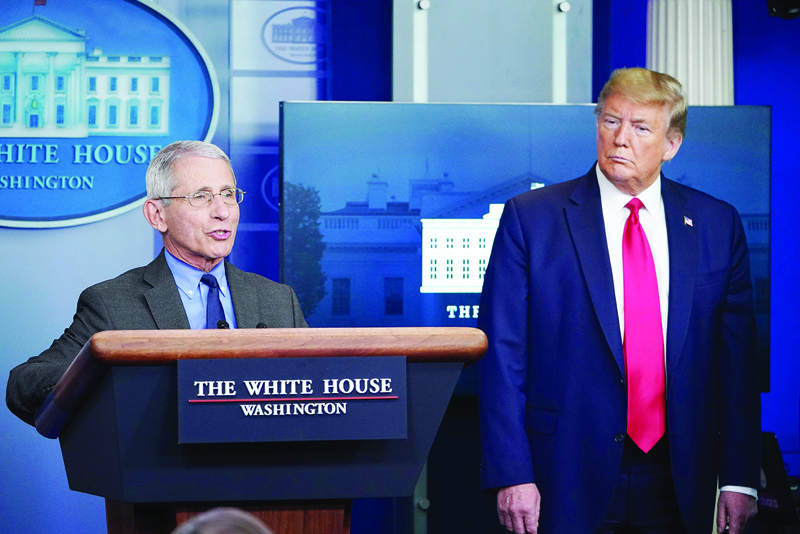
WASHINGTON: A furious, aggrieved President Donald Trump has dismissed rumors that he was going to fire his top medical advisor on the coronavirus pandemic but launched new fights with the Democrats and the media ahead of the high-stakes reopening of the shuttered US economy.
Unusually, the evening briefing at the White House began with a statement by the internationally renowned Dr Anthony Fauci, seeking to defuse speculation that he had fallen out with the Republican president. Referring to a CNN interview on Sunday in which he said that earlier mitigation measures would have dampened the escalation of the COVID-19 crisis in the United States, Fauci explained that he'd been answering a "hypothetical."
Fauci explained his reference in the interview to "pushback" against shutting down the economy-a remark interpreted widely as signaling that Trump was reluctant to take drastic action-as the "wrong choice of words." Trump, who on Sunday fueled speculation by retweeting a critical comment with the hashtag #FireFauci, sought to draw a line under the latest White House turmoil. "I like him," he said of Fauci. "I hear I'm going to fire him. I'm not gonna fire him, I think he's a wonderful guy."
But Trump then launched into a sustained assault on other targets, demonstrating his frustration with accusations that he has mishandled the crisis. With his reelection in November a tight contest against Democrat Joe Biden, Trump is under huge pressure both to crush the pandemic's spread and to rescue the world's biggest economy, which has been paralyzed by social distancing and other virus mitigation measures.
Attack on media
Incensed at what he considers to be unfriendly media coverage, Trump ripped into The New York Times, CNN and other major outlets. "The problem is the press doesn't cover it the way it should," he said of widespread perceptions that the US coronavirus response has been slow and hampered by inefficiencies. Trump said he had been "brutalized" by the media.
Then, in a first for the daily briefings - which have taken an increasingly political tone after having initially been dedicated to informing the public about the coronavirus - Trump made reporters in the room watch a video compilation of officials and others praising his work. Pressured afterward by a CBS News journalist about a long pause before the decision to shut down the economy, Trump lashed out: "You're disgraceful." "You know you're a fake," he told the reporter, seated a few feet away.
To reopen or not
The next phase of the crisis is imminent, with Trump saying he will announce Tuesday the team preparing the reopening of the economy. Refusing to give a date for the reopening, Trump hinted that areas with less coronavirus could be allowed to open earlier, in a staggered operation. He said he was "very close" to having a detailed plan.
But for weeks, the White House has given mixed messages over whether the federal government or states should lead the coronavirus response. Earlier Monday, the governors of California, Oregon and Washington states announced they were coming up with their own coordinated plan for easing social distancing.
Sailor dies of COVID-19
Meanwhile, a sailor who was aboard the USS Theodore Roosevelt aircraft carrier died Monday of COVID-19, the first fatality from nearly 600 confirmed cases among its crew, the US Navy said. The sailor, who tested positive on March 30, was discovered unresponsive on April 9 and placed in the intensive care unit of the navy's hospital in Guam, where the Roosevelt is docked.
The death came six days after Thomas Modly resigned as acting navy secretary over his mishandling of an outbreak on the Roosevelt, one of two US aircraft carriers in the western Pacific.
Modly had earlier fired the Roosevelt's captain, Brett Crozier, after the officer's warning that the shipboard outbreak could dangerously incapacitate much of the crew became public. Crozier had sought to evacuate most of the ship's 4,800 crew after it stopped in Guam on March 27, to test them and sterilize the vessel, but the idea was rejected by his superiors.
With the number of proven cases approaching 100, on March 30 the veteran captain wrote an unclassified, widely-distributed letter addressed to his superiors that quickly leaked to his hometown newspaper, the San Francisco Chronicle. "The spread of the disease is ongoing and accelerating," Crozier wrote. "We are not at war. Sailors do not need to die." Both Modly and Defense Secretary Mark Esper expressed anger that Crozier had violated the Pentagon's chain of command, and they insinuated that the leak to the media was deliberate.
They were also concerned that he had exposed a vulnerability in US military readiness that could encourage adversaries to take advantage. Crozier "demonstrated extremely poor judgment in the middle of a crisis," Modly said after announcing the captain's removal on April 2. The number of COVID-19 cases aboard the ship has continued to mount. With 92 percent of the crew tested, 585 have been infected with the virus, according to the Navy on Monday, including Crozier himself.
'Naive or stupid'
After Crozier's firing, videos appeared on social media that showed members of the Roosevelt's crew applauding him as he walked alone down the gangway onto shore in Guam. The controversial firing sparked questions over whether and why the Navy hierarchy had ignored Crozier's internal requests to evacuate the warship. Modly then flew to Guam where he told the Roosevelt's crew in a profanity-laced speech that their love for Crozier was misguided, calling him "too naive or too stupid."
Those comments exploded in the US media even before Modly returned to the United States, and, having sparked a fresh political firestorm over the handling of the pandemic by the administration of President Donald Trump, he resigned. He was the second permanent or acting navy secretary in six months to depart. His predecessor was fired after clashing with Trump over the president's protection of a Navy Seal who had been charged with war crimes and convicted of lesser charges.- Agencies









